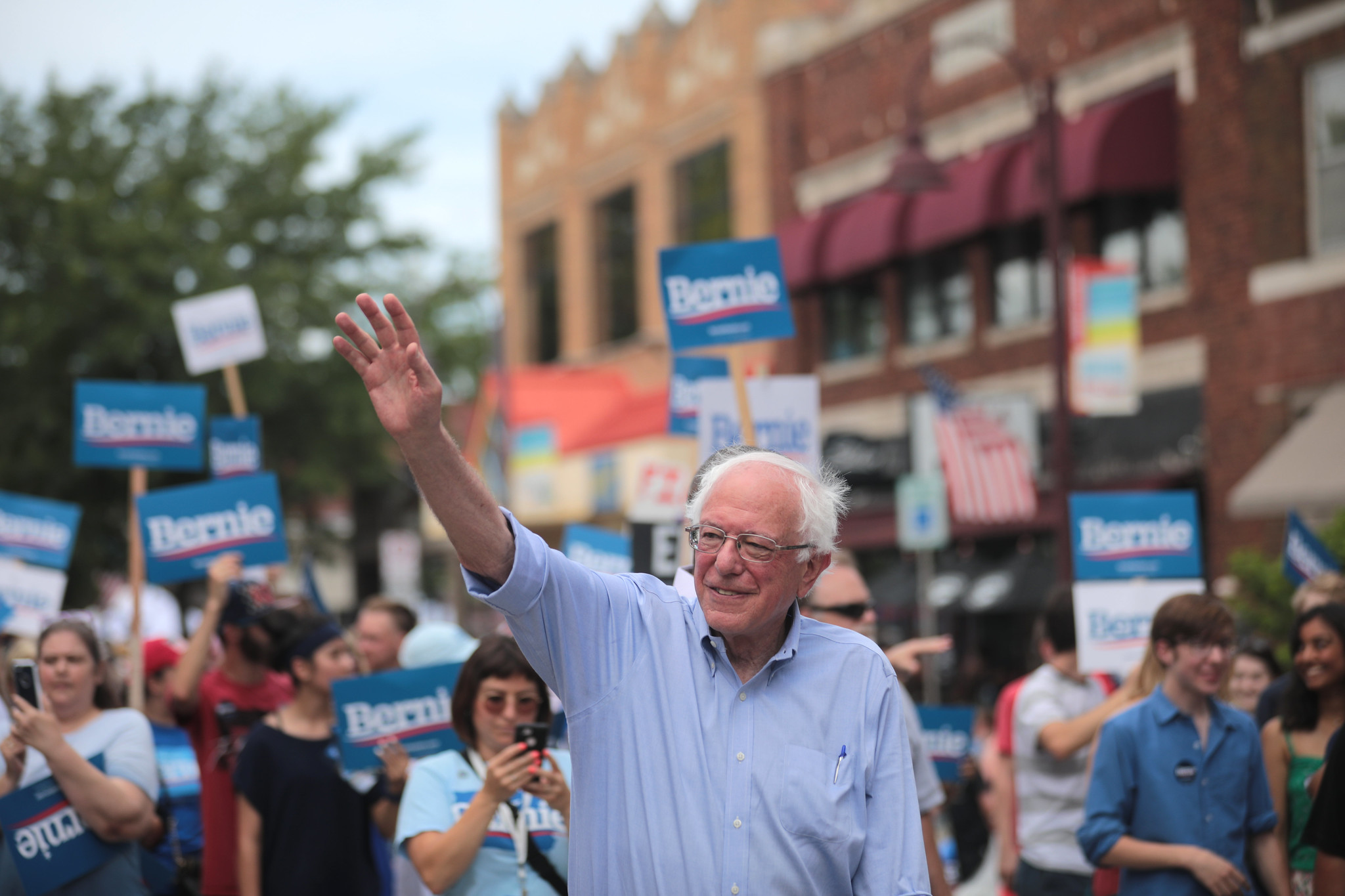As the 2020 presidential campaign unfolds, political lines are sharpening among the three leading candidates for the Democratic Party nominee. Joe Biden, with his obvious allegiance to the ruling class and his consistent bumbling, has become generally unpalatable for most who identify themselves with the progressive wing of the Democratic Party. But among this group, the debate about whether to support Bernie Sanders or Elizabeth Warren, and who between them can beat Biden in the primary, remains significant not just at the national level, but for the future of U.S. politics.
For socialists, the difference between these two candidates can be summed up with two words: class struggle. Initially, this distinction seemed to be one of approach. Earlier this year, Warren announced a number of policy proposals, which, while perceived to be similar to Bernie’s because they expanded social programs, continued means-testing and focused particularly on reforms to curtail the power of finance. Bernie’s approach, on the other hand, has been to organize: sending supporters to picket lines and marching with abortion activists were only two significant steps taken by the Sanders campaign early on to build the foundation for his political revolution.
But with Bernie’s policy platforms on climate, criminal justice, housing, and labor now available, it is clear that he can go toe-to-toe in terms of policy too. More importantly, these platforms have also highlighted that the political differences between Sanders and Warren are far more profound than it might have seemed.
Bernie’s emphasis is on empowering workers to organize to fight the boss, building universal programs like Medicare for All, and nationalizing industry to pave the way for a real Green New Deal. He is not trying to compromise over the “best” ideas that benefit everyone, but rather to empower a majority against a minority. For Sanders, class struggle is a method that leads to outcomes which redistribute power and wealth away from the ruling class and to workers and the disenfranchised. Such a method isn’t a bad definition for socialism itself.
Meanwhile, Warren has taken a quite different tack, one that suggests she is almost certainly bound to run into the traditional problems of compromise and inaction that plagued Barack Obama’s two terms. As the New York Times reported, Warren’s campaign is being funded in part by campaign contributions from elite megadonors she courted throughout 2018. Not only that, but she also stated recently that she intends to return to collecting ruling class contributions once she wins the presidential primary. And to really hammer the point home, Warren has also been, of late, hob-knobbing with DNC insiders, all in a bid to secure support from forces whose interests are clearly aligned with those in power. Jacobin’s Meagan Day is right when she says
“[W]e should see Warren’s temporary abstention from big-dollar Democratic Party fundraising practices for what it is: rather than deriving from deeply held principles, it’s primarily a strategic adjustment in a political climate created by Sanders.”
Warren’s principles don’t include that theory of change which make Bernie’s redistributive proposals a real possibility. Rather, she stands in a long tradition of progressive Democrats who talk a big game about progress only to blame the Republicans or political pragmatism when these proposals are inevitably watered down.
All of this points to a deep divide in principle far beyond the debates between candidates for the Democratic nomination. We can call it class compromise versus class struggle. In fact, it represents what is possibly the most important line socialists looking to build a mass movement to fight the ruling class can draw in this period. In the wake of the explosion of left-wing and progressive politics in the U.S. since 2016 and the subsequent victory of candidates like Alexandria Ocasio-Cortez (AOC) and Rashida Tlaib, it is critical for socialists to keep in mind this difference we have with progressives. While winning reforms can require tactical alliances, socialists have a vastly different vision of what society should look like and how we can get there. This ultimately puts us at odds with progressives.
And while this political process has taken place particularly around national politics, races down-ballot and campaigns undertaken by DSA chapters (including Congressional campaigns) are also operating in this political climate. For that reason, socialists need to get serious about fielding candidates who share in a collective identity based on the kind of class-struggle politics Sanders puts forward.
Many of the challenges inherent in the current moment are on full display in New York City. NYC-DSA has done some stunning electoral work. While our chapter is most famous for helping to elect Alexandria Ocasio-Cortez, we also put longtime member Julia Salazar into office as a state senator and came within a hair’s breadth of electing public defender Tiffany Caban to the position of Queens District Attorney. In 2017, we won 29% of the vote for Jabari Brisport on a third-party ballot line and almost won another city council seat in south Brooklyn. Without a doubt, the electoral work we do in our chapter will continue to break ground and win victories, and so chapter-level debates here have a particular salience to the work we’re doing nationally.
In that context, it’s worth paying attention to a recent resolution submitted to the chapter’s Citywide Leadership Committee. The resolution would require that NYC-DSA only endorse candidates who have themselves endorsed Bernie Sanders. (Although, it has since been changed to arrive at a consensus in the chapter so that only those candidates who have endorsed another candidate in the primary will be ineligible for endorsement.) I support this approach as a key step in developing a class-struggle approach to electoral work. And while the resolution is now weaker, the basic principle that DSA should only endorse candidates who support Bernie Sanders is one that DSA members should hold to during this election cycle when weighing whether or not to endorse a specific candidate.
Support for Sanders is consistent with a program that socialists should fight for at all levels of government: democratic control over dependence on private capital, universal rather than means-tested programs, and support for workers’ efforts to unionize and strike. These are basic planks of any socialist policy platform, and as we construct our movement in the U.S., building a consensus that this approach is the best way to improve living conditions will be a key responsibility for that movement. The good news about this is that, as anyone who has canvassed for Medicare for All knows, these ideas are basic common sense to most working people, especially after decades of decimation of social programs.
The principle also helps reinforce the idea that DSA supports distinctive candidates and reinforces their identity as belonging to a unified democratic socialist movement inspired by Bernie. Strengthening this sense of collective political identity and strategy is important to building a movement with the cohesiveness needed to avoid co-optation and the strength to ultimately build an independent party of and for the working class. Doing so can also help foster a stronger sense of identification of our candidates with DSA and make them more organically accountable to the organization.
This issue isn’t abstract, either: Although AOC for example plays a commendable role in U.S. politics, it is unfortunate that she has chosen to downplay her democratic socialist identity and is unaccountable to a democratic, membership organization like DSA. Indeed, given her unique platform in U.S. politics today, the fact that she has not yet endorsed Sanders represents a serious missed opportunity for the movement. And it is exactly this kind of political calculation that undermines a key feature of our electoral work: that we as socialists contest elections not to advance individuals’ careers or platforms, but to build a movement. We rise and fall together, and the candidates we endorse should embrace that ethos as well.
Moreover, it is hard to imagine how not endorsing Bernie could benefit a candidate if their goal is mass-movement building rather than insider politicking. Bernie is overwhelmingly popular with young people, people of color, and workers: a wide-ranging constituency that cuts across geographic and traditional partisan divides and which forms a powerful base for democratic socialist politics.
Bernie’s base is unique in this sense: Highly mobilized and clearly dedicated to a distinctly socialist program, it therefore contains key elements to form a political current independent from mainstream progressive politics. Organizing that current, first into a movement that is steadfastly dedicated to mass organizing and fighting the ruling class (say, for example, by uniting candidates into a socialist caucus), and then into an independent socialist party at some point in the future is the most realistic strategy for socialists to start democratizing our society. Making sure that we have campaigns that generate, and allow us to organize and deepen, political processes like that set off by the Bernie campaign is therefore central to the longer term project of building a party of our own.
With that in mind, we can understand better why our original resolution was structured in a way that prevents DSA from taking certain actions. The resolution says that it’s worth sacrificing something (the endorsement of candidates who don’t endorse Bernie) in order for us to more effectively carry out a strategy.
This resolution may lead to instances where candidates who are genuine progressives do not get our endorsement. But in such situations it’s worth recognizing that candidates who are not really socialists are likely to get support from other progressive organizations. Perhaps they will even manage to get elected: but deciding not to do work that does not directly help us to carry out our goals is not missing an opportunity. Indeed, that’s what it means to have a strategic priority. And there is no stronger priority for socialists than the building of a mass movement for the self-emancipation of the working class. Over the next year, fighting to elect Bernie is the most important way to advance that movement. And we should expect that any candidate who claims to be a socialist will share that conviction.




